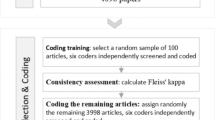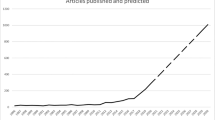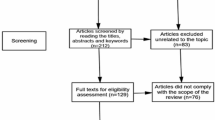Abstract
Today, the field of education is the subject of various reforms at several levels, either pedagogical, didactic or technological, especially with the rapid and continuous evolution of ICT which means information and communication technologies, the resulting constraints and the challenges of the Covid-19 epidemic, as well as the new understanding of the teaching-learning process and the psychology of learning. In this regard, the present study aims to collect the most requested research topics in doctoral studies centers, indexed conferences and journals, related to this field, and then analyze them to determine their categorization, as well as define the current trends and the lines of research necessary to meet the needs of the educational field. To do this, a bibliometric approach, taking advantage of the univariate indicators development method and relational indicators development method, is implemented to effectively achieve the objectives of the study.
Access this chapter
Tax calculation will be finalised at checkout
Purchases are for personal use only
Similar content being viewed by others
References
Immanuel, K., Philonenko, A.: Réflexions sur l’éducation. Vrin (1993)
Reboul, O.: Chapitre II-Qu’est-ce que l’éducation ?. In: Reboul, O éd. La philosophie de l’éducation, pp. 16–27. Presses Universitaires de France, Paris cedex 14 (2016)
Mykhailyshyn, H., Kondur, O., Serman, L.: Innovation of education and educational innovations in conditions of modern higher education institution. J. Vasyl Stefanyk Precarpathian Natl. Univ. 5(1), 9–16 (2018). https://doi.org/10.15330/jpnu.5.1.9-16
Mastafi, M.: Définitions des TIC(E) et acception. In: Bacha, J., Ben Abid-Zarrouk, S., Kadi, L., Mabrour, A. Penser les TIC dans les universités du Maghreb, L'Harmattan (2010)
Stone, P., Brooks, R., Brynjolfsson, E., Calo, R., Etzioni, O., Hager, G., Hirschberg, J., Kal-yanakrishnan, S., Kamar, E., Kraus, S., Leyton-Brown, K., Parkes, D., Press, W., Saxenian, A., Shah, J.,Tambe, M., Teller, A.: Artificial Intelligence and life in 2030: the one hundred year study on artificial intelligence. Stanford University (2016)
Holmes, W., Bialik, M., Fade, C.: Artificial Intelligence in Education. Center for Curriculum Redesign (2019)
Alvarez, J.: DU JEU VIDÉO AU SERIOUS GAME, Université Toulouse (2007)
Lemaître, D.: L’innovation pédagogique en question : analyse des discours de praticiens. Revue internationale de pédagogie de l’enseignement supérieur 34(34(1)) (2018). https://doi.org/10.4000/ripes.1262
Gunderson, D., Moore, J.: Group learning pedagogy and group selection. Int. J. Constr. Educ. Res. 4(1), 34–45 (2008). https://doi.org/10.1080/15578770801943893
Chalon-Blanc, A.: Piaget Constructivisme Intelligence: L’avenir d’une théorie. Presses Univ, Septentrion (2011)
Kerzil, J.: Constructivisme. ERES (2009)
Jonnaert, P., M’Batika, A.: Les réformes curriculaires: Regards croisés. PUQ (2004)
Singh, H.: Building effective blended learning programs. In: Challenges and Opportunities for the Global Implementation of E-Learning Frameworks, IGI Global (2021)
UNESCO: Principes directeurs de l’UNESCO pour l’apprentissage mobile. UNESCO (2013)
Bhattacharjee, D., Paul, A., Kim, J.H., Karthigaikumar, P.: An immersive learning model using evolutionary learning. Comput. Electr. Eng. 65, 236–249 (2018). https://doi.org/10.1016/j.compeleceng.2017.08.023
Guilbault, M., Viau-Guay, A.: La classe inversée comme approche pédagogique en enseignement supérieur : état des connaissances scientifiques et recommandations. Revue internationale de pédagogie de l’enseignement supérieur 33(33(1)), 0383–0802 (2017)
Saadiah, Y., Erny, A., Kamarularifin Abd, J.: The definition and characteristics of ubiquitous learning: a discussion. Int. J. Educ. Dev. Using ICT 6(1), 1814-0556 (2010)
Rostaing, H.: La bibliométrie et ses techniques. Sciences de la Société (1996)
Marcon, C.: Approche bibliométrique élémentaire des publications en intelligence économique dans les revues françaises en sciences de l’information et la communication. Communication et organisation. Revue scientifique francophone en Communication organisationnelle, vol. 47, pp. 236–252 (2015). https://doi.org/10.4000/communicationorganisation.4983
Aqqal, A., Labouidya, O., Dahbi, A., Haidine, A.: L'évaluation et l'éducation dans le monde et au Maroc : approche bibliométrique et premier bilan. In: Kaaouachi, A (dir.), L'évaluation de l'enseignement supérieur et de la recherche : description, analyse et étude de cas, ISBN :978-9954-36-178-8, Imprimerie Jossour (2015)
Vergnas, O.L., Bury, P.: Analyse du corpus de référence des thèses françaises concernant la recherche sur la formation des adultes soutenues depuis 2010: thématiques, rattachements et spécificités. Savoirs 54(3), 83–107, 1763–4229 (2020)
Kizaba, G.: Revues scientifiques et 10 ans de recherche francophone en entrepreneuriat. Innovations 24(2), 231–258, 1267–4982 (2006)
Zheliazkova, I.: An intelligent system for teaching and learning algorithms. Comput. Educ. 24(2), 117–125, 0360–1315 (1995)
Holmes, W., Bialik, M., Fadel, C.: Artificial Intelligence in Education. Promise and Implications for Teaching and Learning. Center for Curriculum Redesign, 978-1794293700 (2019)
Chen, L., Chen, P., Lin, Z.: Artificial intelligence in education: a review. IEEE Access 8, 75264–75278 (2020). https://doi.org/10.1109/ACCESS.2020.2988510
Author information
Authors and Affiliations
Corresponding author
Editor information
Editors and Affiliations
Rights and permissions
Copyright information
© 2023 The Author(s), under exclusive license to Springer Nature Switzerland AG
About this paper
Cite this paper
Ezzaim, A., Dahbi, A., Aqqal, A., Haidine, A. (2023). The Future of Education-A Survey of Current Scientific Research Trends. In: Hassanien, A.E., Snášel, V., Tang, M., Sung, TW., Chang, KC. (eds) Proceedings of the 8th International Conference on Advanced Intelligent Systems and Informatics 2022. AISI 2022. Lecture Notes on Data Engineering and Communications Technologies, vol 152. Springer, Cham. https://doi.org/10.1007/978-3-031-20601-6_37
Download citation
DOI: https://doi.org/10.1007/978-3-031-20601-6_37
Published:
Publisher Name: Springer, Cham
Print ISBN: 978-3-031-20600-9
Online ISBN: 978-3-031-20601-6
eBook Packages: Intelligent Technologies and RoboticsIntelligent Technologies and Robotics (R0)




